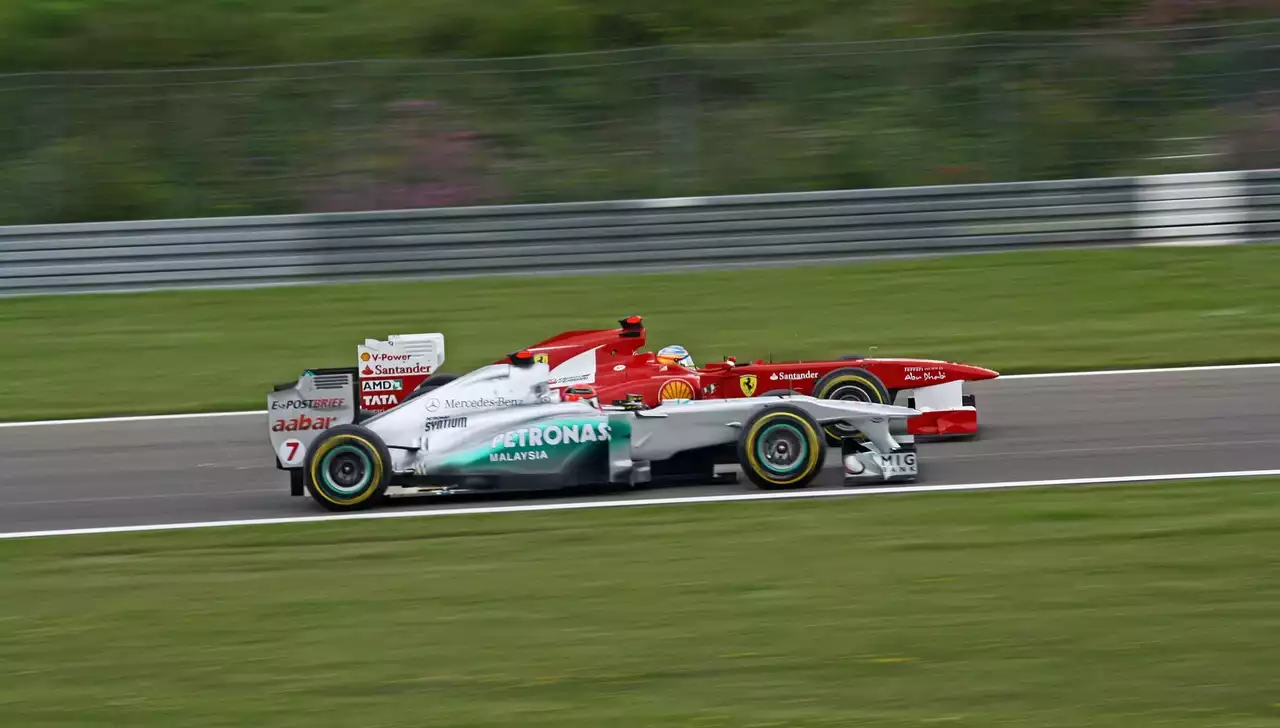Early life and career
Michael Schumacher was born on January 3, 1969, in Hürth, Germany. His father ran a karting track, and Michael and his younger brother Ralf quickly developed a passion for the sport. Michael began racing karts at the age of four and quickly showed his natural talent on the track. By the time he was a teenager, Schumacher was competing at the national level and had caught the attention of local motorsport officials.
In 1984, Schumacher won the German Junior Karting Championship and was awarded a test drive in a Formula Ford car. He impressed the team with his speed and was offered a drive for the following season. Schumacher quickly adapted to the higher speeds and more powerful cars, winning several races and finishing second in the Formula Ford Championship. His success caught the attention of Mercedes, who offered him a drive in the German Touring Car Championship (DTM) for the 1989 season.
Schumacher's debut season in the DTM was a steep learning curve, but he showed flashes of his potential with a podium finish and several strong performances. His form caught the attention of Jordan Grand Prix, who offered him a drive in F1 for the 1991 season.
Schumacher's rise to dominance in F1
Schumacher's debut season in F1 was a mixed bag. Despite showing flashes of his potential, he was hampered by a lack of experience and an uncompetitive car. However, he showed enough promise to convince Benetton to sign him for the 1992 season.
Schumacher's first season with Benetton was a breakthrough year. He won his first Grand Prix in Belgium and finished third in the Drivers' Championship. The following year, Schumacher won his first World Championship, becoming the youngest ever champion at the age of 25. He followed this up with back-to-back titles in 1995 and 1996, establishing himself as the dominant force in F1.
Schumacher's success was due to a combination of natural talent and his meticulous preparation. He was known for his intense training regime and his willingness to push himself and his team to the limit. He also had a fierce competitive streak, and was not afraid to take risks on the track to gain an advantage.
Impact on F1 racing and legacy
Schumacher's dominance on the F1 circuit had a profound impact on the sport. He pushed the boundaries of what was possible in terms of performance and preparation, and his success inspired a new generation of drivers to follow in his footsteps. He also paved the way for the modern era of F1, where technology and data analysis play a crucial role in success.
Schumacher's legacy in the sport is secure. He holds numerous records, including the most World Championships, most Grand Prix wins, and most pole positions. He also set the benchmark for professionalism and preparation, and his influence can still be seen in the sport today.
Schumacher's most iconic moments and achievements
Schumacher's career was full of iconic moments and achievements. Some of his most memorable include:
- Winning his first Grand Prix in Belgium in 1992. - Winning his first World Championship in 1994, despite a controversial collision with Damon Hill in the final race of the season. - Winning back-to-back titles in 1995 and 1996, cementing his status as the dominant force in F1. - His duel with Mika Hakkinen in the late 90s and early 2000s, which produced some of the most thrilling racing in F1 history. - Winning five consecutive titles with Ferrari between 2000 and 2004, establishing himself as the greatest driver of his generation.
Controversies and setbacks in Schumacher's career
Despite his incredible success, Schumacher's career was not without controversy and setbacks. One of the most infamous moments came in the 1997 season, when Schumacher deliberately collided with Jacques Villeneuve in the final race of the season in an attempt to win the title. He was disqualified from the championship and fined $500,000.
Schumacher also suffered several serious injuries during his career. In 1999, he broke his leg in a crash at the British Grand Prix, forcing him to miss several races. He also suffered a serious head injury in a skiing accident in 2013, which left him in a coma for several months.
Schumacher's retirement and return to F1
Schumacher retired from F1 at the end of the 2006 season, but returned to the sport in 2010 with Mercedes. His comeback was not as successful as his previous stints in F1, and he failed to win a race in his three seasons with the team. He retired for good at the end of the 2012 season.
Life after F1 and the accident
After retiring from F1, Schumacher remained involved in the sport as an ambassador for Mercedes. However, tragedy struck in 2013 when he suffered a serious head injury in a skiing accident in the French Alps. He was placed in a medically-induced coma and spent several months in hospital before being transferred to a rehabilitation facility.
Since the accident, Schumacher's family has kept his condition private, and little is known about his current state of health.
Schumacher's influence on the sport and future drivers
Schumacher's influence on F1 cannot be overstated. He pushed the boundaries of what was possible both on and off the track, and his success inspired a new generation of drivers to follow in his footsteps. His legacy can be seen in the modern era of F1, where technology and data analysis play a crucial role in success.
Schumacher's impact on the sport will be felt for decades to come, and his record-breaking achievements will continue to inspire future generations of drivers to push themselves to new heights.














